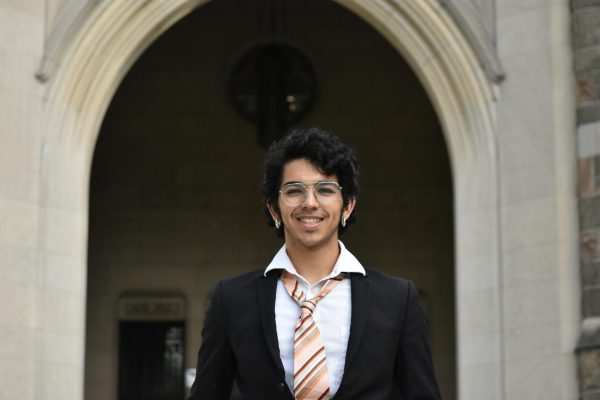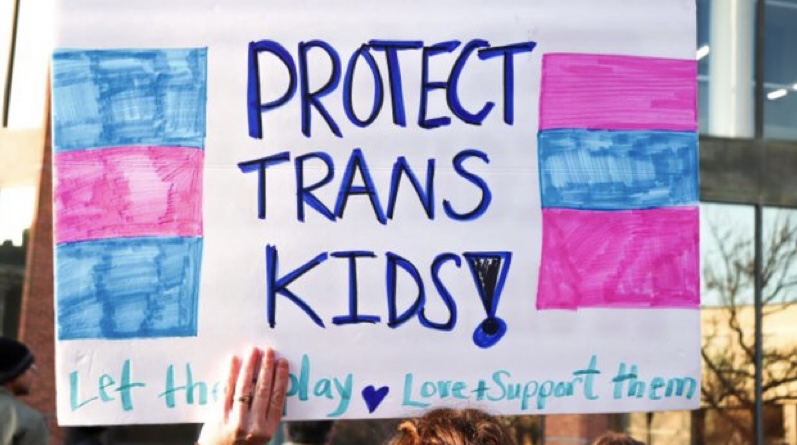State-Sponsored Trans Violence is Genocide
Between March 12 and 19, five discriminatory bills against transgender people were passed into law in five states, while nine bills of the same type were proposed and filed in four other states. In that stretch of time, it became illegal to provide gender-affirming healthcare (including hormone treatment therapy and surgeries) in Florida.
Since the start of 2023, the Human Rights Campaign has officially identified six instances of fatal violence against transgender people as hate crimes alongside a concerningly-long list of incidents of fatal anti-trans hate crimes in the last three years alone (all in the United States). These are just the ones that have been reported.
It’s time that we recognize the state-supported and social violence against the country’s transgender population exactly what it is: genocide.
To outline how genocides are formed, carried out and how they can be stopped, the Holocaust Memorial Day Trust published “The Ten Stages of Genocide.” The eighth stage, Persecution, reads:
“Victims are identified because of their ethnicity or religion and death lists are drawn up. People are sometimes segregated into ghettos, deported or starved and property is often expropriated. Genocidal massacres begin.”
This isn’t a 1:1 exact match to the current conditions of transgender people under the state, as history cannot be forced into universal and transhistorical patterns. However, patterns emerge. While it isn’t an ethnicity or religion, transgenderism is an identity that can be abjected and vilified by an oppositional hegemony. Transgender people are becoming officially identified in law that are actively seeking to harm and suffocate the existence of transgender communities.
For example, the Kentucky Senate Bill 150 (SB150, passed on March 15) combined three bills into a long list of anti-trans legislation, which includes a ban on trans people using bathrooms corresponding to their identity, a ban on teaching about sexual orientation or gender identity, a prohibition on the requirement to correctly gender students through pronoun use and the outlawing of gender-affirming healthcare for trans youth. Beyond calling SB150 “the worst anti-trans bill in the nation,” the Kentucky ACLU stated that “[t]his dangerous bill and others like it across the country are nothing more than a desperate attempt to score political points by targeting people who simply want to live their lives.”
This, like all anti-trans legislation, is an example of state-sanctioned violence and cannot be praised without also calling for the destruction of trans communities.
In fact, these kinds of bills are just cruel reminders that the state serves a solitary purpose of social repression, giving us our rights for the sake of complacency or taking them away when our existence threatens the stability of the state’s structure.
The term “genocidal massacre,” as it was coined by South African sociologist Leo Kuper, refers to identity-targeted murders occurring on levels smaller than direct genocides. To deny that genocidal massacres are beginning to occur against LGBTQ+ communities is to spit in the face of history.
Not only are anti-trans violent hate crimes occurring at higher rates than before, but they are becoming larger in scale. For instance, consider the recent shooting at Club Q in Colorado Springs. On Nov. 19, 2023, a shooter entered the club as it was closing a drag show and in the midst of a dance party when, armed with an AR-15, the shooter shot and killed five club patrons, injuring 17 others. The shooting occurred just a day before the Transgender Day of Remembrance.
As a threat to transgender livelihood, the Club Q shooting was successful. In the shooting’s aftermath, drag queens and drag show organizers responded by upping security, preventative measures and contingency plans in preparation for further violence.
The second-deadliest shooting in U.S. history occurred in an LGBTQ+ nightclub, Pulse, just over six years ago. 49 dead. 53 injured.
The Ten Stages of Genocide provide historical perspective when looking at this issue. For Persecution to occur in a society, it must be preceded by Classification. The stages of Symbolization, Discrimination, Dehumanisation, Organisation, Polarization and finally Preparation have already occurred. The stages have occurred through anti-trans rhetoric spouted by right-wing media and lawmakers. The final stage of genocide is Extermination. It will occur if the state is allowed to continue its operation.
I cannot take credit for identifying the emerging pattern of anti-trans violence as the pattern of genocide. The parallels should be clear to anyone versed in historical analysis. At least one state official has also come forward with this opinion. Nebraska State Senator Machaela Cavanaugh compared historical examples of genocide to two bills that were being debated in the state senate. The bills in question would ban the healthcare of trans and gender dysphoric youth and place restrictions on bathrooms and sports assignments. In her comparisons, Cavanaugh said “there is always a set of circumstances which occur or which are created to build the climate in which genocide can take place.”
In response, Cavanaugh was threatened with censure, which is “a formal statement of disapproval… that can have a powerful psychological effect on a member and his/her relationships in the Senate.” In the history of the Nebraska State Senate, imposition of censure has not occurred since its only usage in 1955 after a state senator participated in a blackmail scheme.
If all that changes as a result of anti-trans violence is the beefing of security, then, as a society, all that we’ve done is normalized anti-trans violence and allowed it to continue. This is unacceptable. Communities cannot continue to live in fear.
As I write this article in honor and remembrance of the transgender people who have inspired me in life and death, it makes my heart ache to think that the politicization of our group’s “right to exist” has led to violence on such a large scale. It should be a wake-up call for people still “on the fence” to realize that many still believe there’s moral decay, degeneracy or failure in a social superstructure that allows for the existence and prosperity of transgender people to such a degree that violence, both supported and carried out by the state, would be seen as necessary.
Taking even a moderate stance on the politicized right for transgender people to exist is actively harmful; the only correct choice is to wholeheartedly support the continued struggle for the existence of transgender communities across the country.
Sebastian Diaz, FCRH ’24, is a journalism and film major from Chapel Hill, N.C.

Sebastian Diaz is a senior from Chapel Hill, N. C. who is double majoring in journalism and film. After starting as a news reporter for The Fordham Ram...










































































































































































































